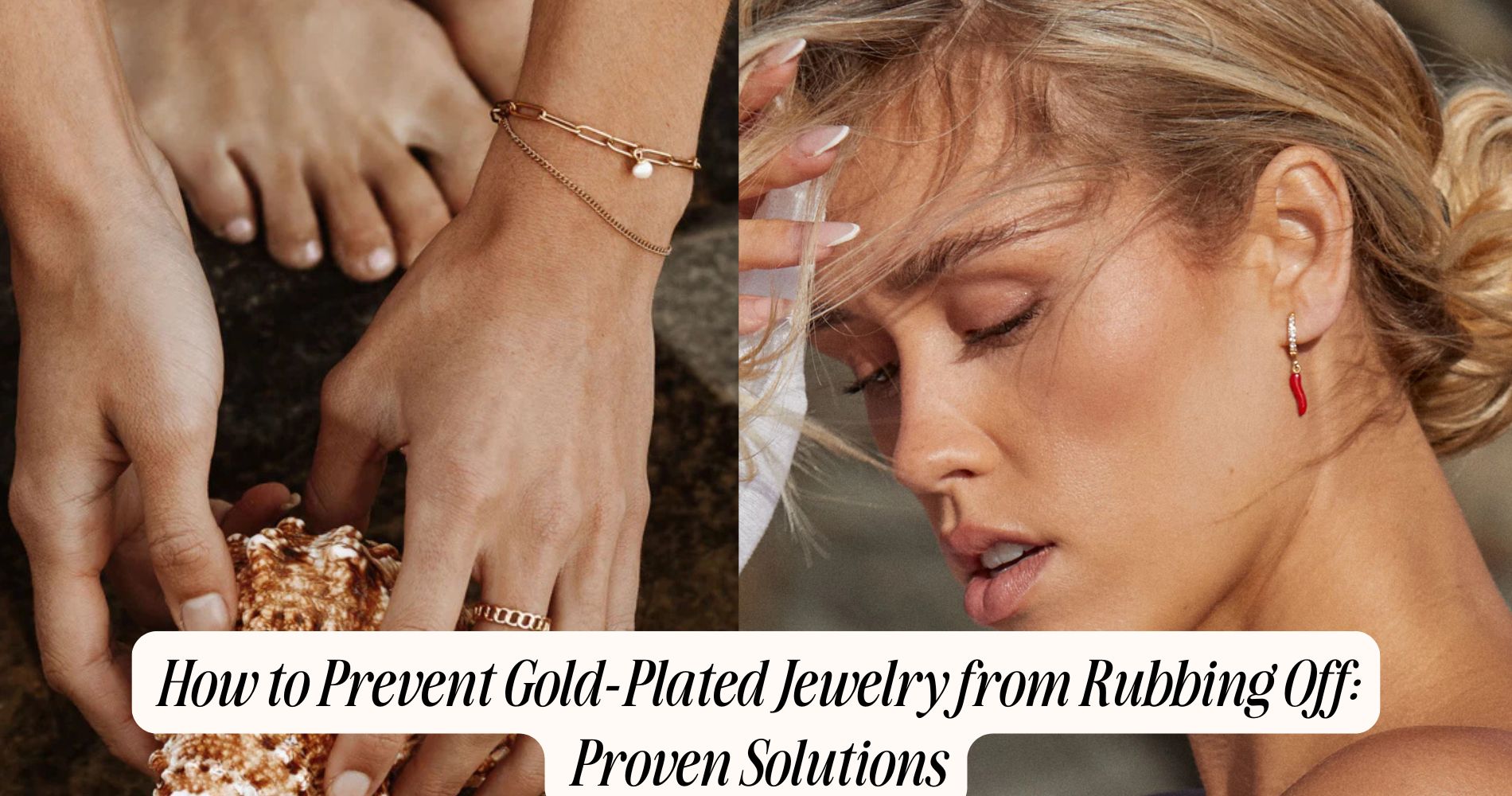
How to Prevent Gold-Plated Jewelry From Rubbing Off: Proven Solutions
How to prevent gold-plated jewelry from rubbing off starts with choosing high-quality pieces with at least 14k plating. Avoid exposing your jewelry to harsh chemicals in perfumes, cleaners, and lotions, as these can damage the delicate gold layer. Store your pieces in a cool, dry place, ideally in anti-tarnish pouches to reduce moisture. Clean your jewelry every few weeks using mild soap and a soft cloth, steering clear of abrasive materials. Additionally, remove your jewelry during strenuous activities or when applying beauty products. By following these tips, you can keep your gold-plated pieces looking beautiful for longer. If you're searching for durable and stylish everyday gold jewelry, check out our collection for timeless options.
Understanding Gold-Plated Jewelry
When you choose gold-plated jewelry, you're opting for a beautiful and affordable alternative to solid gold. Gold plating involves a layer of gold applied to a base metal, typically sterling silver or brass, using electrolysis. This process gives your jewelry that luxurious gold appearance without the hefty price tag.
However, it's crucial to understand that the durability of gold plating can vary greatly based on the thickness of the gold layer and the quality of the base metal.
To maintain your gold-plated pieces, proper jewelry care is critical. Avoid exposing them to harsh chemicals, such as those found in perfumes, lotions, and cleaning products, as these can accelerate tarnishing.
When you wear your jewelry, try to keep it away from sweat and moisture, as these elements can also wear down the gold plating over time.
Storing your gold-plated jewelry in a cool, dry place, preferably in a soft pouch or lined box, can help minimize scratches and tarnishing.
Choosing Quality Pieces
Selecting quality gold-plated jewelry requires a keen eye for detail and an understanding of the craftsmanship involved. To guarantee you're making a wise investment, start by examining the plating thickness. Look for pieces with at least 14k gold plating, as thicker layers are less likely to wear off quickly.
Next, consider the base metal. Opt for items made with durable materials like sterling silver or stainless steel, which can enhance longevity. Pay attention to the finishing techniques used; high-quality jewelry often features a polished, smooth surface that minimizes scratches and tarnishing.
While you're evaluating potential pieces, keep your budget considerations in mind. It's important to strike a balance between quality and affordability. Investing a little more upfront for a well-crafted item can save you from frequent replacements.
Finally, align your choices with your style preferences. Whether you favor minimalist designs or intricate styles, selecting pieces that resonate with your aesthetic will encourage you to wear them regularly, ultimately reducing the chance of wear and tear.
Proper Storage Techniques
To keep your gold-plated jewelry in pristine condition, store it in soft pouches to prevent scratches and friction.
It's also essential to keep your pieces away from moisture, as humidity can accelerate tarnishing and wear.
Use Soft Pouches
Storing your gold-plated jewelry properly can greatly extend its lifespan and maintain its appearance. One of the most effective methods is to use soft pouches for storage. These pouches provide numerous soft pouch benefits, including reducing the risk of scratches and tarnishing.
Unlike hard cases or jewelry boxes, soft pouches conform to the shape of your jewelry, minimizing movement and friction. When you place your gold-plated pieces in a soft pouch, you're not just protecting them from scratches. You're also shielding them from dust and dirt that can accumulate over time.
To maximize your jewelry protection tips, always verify your pouches are clean and dry before placing your jewelry inside. Additionally, avoid overcrowding your pouches. Storing multiple pieces together can lead to tangling and scratching, which defeats the purpose of using soft pouches.
Instead, consider using separate pouches for each piece, especially for delicate items.
Keep Away From Moisture
Moisture is one of the biggest enemies of gold-plated jewelry, as it can lead to tarnishing and degradation of the plating. To prevent moisture damage, it's essential to store your jewelry in a dry environment. High humidity can accelerate the corrosion process, causing unsightly discoloration and dullness.
When storing your gold-plated pieces, consider using airtight containers or specialized jewelry boxes designed to reduce humidity effects. Adding silica gel packets can further absorb excess moisture, keeping your jewelry dry and protected.
Avoid leaving your jewelry in areas prone to moisture, like bathrooms or near windows, where humidity levels fluctuate.
Before putting your jewelry away, make sure it's completely dry. If you've worn it in humid conditions or after sweating, gently wipe it with a soft cloth to remove any moisture. This simple step can greatly extend the life of your gold plating.
Ultimately, by being mindful of moisture exposure and implementing proper storage techniques, you can maintain the beauty and integrity of your gold-plated jewelry for years to come.
Avoiding Harsh Chemicals
Harsh chemicals can greatly damage gold-plated jewelry, leading to a loss of luster and the possibility of exposing the base metal underneath. To maintain the beauty of your jewelry, it's essential to avoid exposure to strong chemicals found in household cleaners, perfumes, and beauty products. These substances can trigger chemical reactions that wear down the gold layer, making it more susceptible to rubbing off.
When you're performing jewelry care, always opt for gentle, non-abrasive products. Read labels carefully, and steer clear of items containing alcohol, bleach, or ammonia.
Even some natural ingredients, like vinegar or lemon juice, can be too acidic and harmful to gold plating.
Additionally, it's a good idea to remove your jewelry before using any chemicals. This includes cleaning supplies or engaging in activities like swimming in chlorinated pools, where chemicals can linger and cause damage.
Regular Cleaning Methods
To keep your gold-plated jewelry looking its best, incorporating regular cleaning methods into your routine is crucial. Start by establishing a cleaning frequency that suits your lifestyle; ideally, you should clean your jewelry every few weeks. This helps prevent buildup from dirt, oils, and cosmetics that can dull its shine.
When selecting cleaning products, opt for gentle solutions that won't damage the gold plating. A mild soap mixed with warm water works wonders. Soak a soft, lint-free cloth in the solution, gently wipe down your jewelry, and rinse it with clean water to remove any soap residue.
Avoid using abrasive materials or harsh chemicals, as they can strip away the gold layer. For pieces that require a bit more attention, consider using a specialized jewelry cleaner designed for gold-plated items. Follow the manufacturer's instructions carefully to make sure you're not compromising the plating.
Finally, always dry your jewelry thoroughly with a soft cloth after cleaning to prevent water spots and maintain its brilliance. By making these cleaning methods a regular part of your jewelry care routine, you'll extend the life of your gold-plated pieces considerably.
Limiting Exposure to Moisture
To preserve the integrity of your gold-plated jewelry, it's essential to limit its exposure to moisture.
Avoid wearing your pieces while swimming, showering, or engaging in activities that may cause them to come into contact with water.
Additionally, storing your jewelry in a dry place and considering protective coatings can greatly enhance its longevity.
Avoid Water Contact
Water can be one of the biggest enemies of gold-plated jewelry, greatly accelerating the wear and tear of its delicate finish. When you expose your pieces to water, you're inviting potential water damage that can strip away the thin layer of gold.
The moisture impact is particularly severe in environments like pools, hot tubs, or even during daily activities like washing hands.
To preserve your jewelry, make it a habit to remove it before engaging in any water-related activities. This includes showering, swimming, or washing dishes.
Even the steam from hot showers can create a humid environment that affects the jewelry's integrity.
Additionally, it's wise to avoid wearing your gold-plated items during exercise or when you're likely to sweat. Sweat contains salts and other chemicals that can corrode the finish over time.
You should also be cautious with products like lotions, perfumes, and cleaning agents, which can react negatively with the plating.
Store in Dry Place
While you might be tempted to toss your gold-plated jewelry into a drawer or jewelry box, storing it in a dry place is essential for maintaining its quality and appearance. Moisture can be a major enemy to gold-plated jewelry, as it promotes tarnishing and can lead to the gradual wearing away of the gold layer.
To prevent this, make sure your jewelry storage environment is kept in dry conditions. Consider using anti-tarnish pouches or silica gel packets in your storage area to absorb excess moisture. You can also opt for airtight containers to add an extra layer of protection against humidity.
When organizing your jewelry, avoid stacking pieces directly on top of each other, as this can create friction and increase the likelihood of wear. Instead, use individual compartments or soft cloth pouches for each item.
Regularly check your storage space for any signs of dampness. If you notice any moisture, take action immediately by moving your jewelry to a drier location.
Use Protective Coatings
Even with proper storage, gold-plated jewelry can benefit from additional protective measures.
One effective way to limit exposure to moisture and prevent the gold plating from rubbing off is to use protective coatings. Applying a clear coating or protective spray creates a barrier that shields the gold surface from environmental factors that can cause wear and tarnishing.
When selecting a protective spray, choose one specifically designed for jewelry. These sprays often contain ingredients that are safe for metals and can help repel moisture.
Before applying, verify your jewelry is clean and dry; this will allow the protective coating to adhere better and provide maximum protection.
To apply a clear coating, hold the spray about 6-8 inches away from the jewelry and apply a light, even coat. Let it dry completely before wearing your pieces.
Remember to reapply the coating every few months, especially if you frequently wear the jewelry.
Wearing Jewelry Responsibly
To maintain the beauty and longevity of your gold-plated jewelry, it's essential to wear it responsibly. Responsible wearing starts with understanding the activities you engage in while adorned with your pieces.
For instance, remove your jewelry when exercising, swimming, or doing household chores, as these activities can expose your items to sweat, chemicals, or rough surfaces that may wear down the gold plating.
Mindful accessorizing is equally important. Consider the environment and occasion when choosing your jewelry. Opt for lighter pieces during casual outings, and save your more intricate designs for special events.
Also, be cautious about layering multiple pieces; this can create friction, leading to premature wear.
Another key aspect is to keep your jewelry away from harsh substances, such as perfumes, lotions, and cleaning products. These can cause the gold plating to tarnish or rub off more quickly.
Finally, store your jewelry separately to prevent scratches and tangles. By adopting these practices, you'll not only keep your gold-plated jewelry looking stunning but also extend its lifespan, ensuring it remains a cherished part of your collection for years to come.
Seeking Professional Maintenance
Professional maintenance is essential for preserving the allure of your gold-plated jewelry over time. Regular professional inspections can identify any wear and tear before it becomes a significant issue. Jewelers have the expertise and tools to assess the condition of your pieces accurately, guaranteeing they remain in top shape.
During a professional inspection, your jeweler will check for signs of fading or damage. They can provide maintenance tips tailored to your jewelry's specific needs, such as cleaning techniques that won't compromise the gold plating. For instance, using a soft, lint-free cloth regularly can help maintain its shine without scratching the surface.
In addition to inspections, consider having your jewelry re-plated every few years, depending on how often you wear it. This process can restore the original luster and protect against further wear.
Investing in professional maintenance not only enhances the longevity of your gold-plated jewelry but also guarantees that it continues to dazzle.
Frequently Asked Questions
Can I Wear Gold-Plated Jewelry in the Shower?
You shouldn't wear gold-plated jewelry in the shower. The shower effects, like humidity and soap, can damage your jewelry's finish. Proper jewelry care involves removing it before bathing to maintain its appearance and longevity.
How Long Does Gold Plating Typically Last?
Gold plating typically lasts from a few months to several years, depending on the gold plating lifespan. Factors affecting durability include wear frequency, exposure to moisture, and the thickness of the gold layer.
Is Gold-Plated Jewelry Safe for Sensitive Skin?
Gold-plated jewelry can be safe for sensitive skin, but it may cause allergic reactions or skin irritation in some individuals. Always check the base metal and consider hypoallergenic options to minimize potential issues.
Can I Repair Gold-Plated Jewelry Myself?
Yes, you can repair gold-plated jewelry yourself with DIY repair kits designed for gold plating. These kits often include special solutions and tools to help you restore the jewelry's luster and protect it from further wear.
What Should I Do if My Jewelry Starts to Tarnish?
If your jewelry starts to tarnish, try gentle cleaning methods like a soft cloth or mild soap solution. Avoid harsh chemicals, and always store your tarnished jewelry properly to prevent further damage and maintain its shine.
Conclusion
By following these proven strategies, you can greatly extend the life of your gold-plated jewelry. Choose high-quality pieces, store them properly, and avoid harsh chemicals to maintain their shine. Regular cleaning and limiting moisture exposure will also help prevent wear. Remember to wear your jewelry responsibly, removing it during strenuous activities. If you ever notice signs of wear, don't hesitate to seek professional maintenance. With a little care, your gold-plated pieces can remain beautiful for years to come.









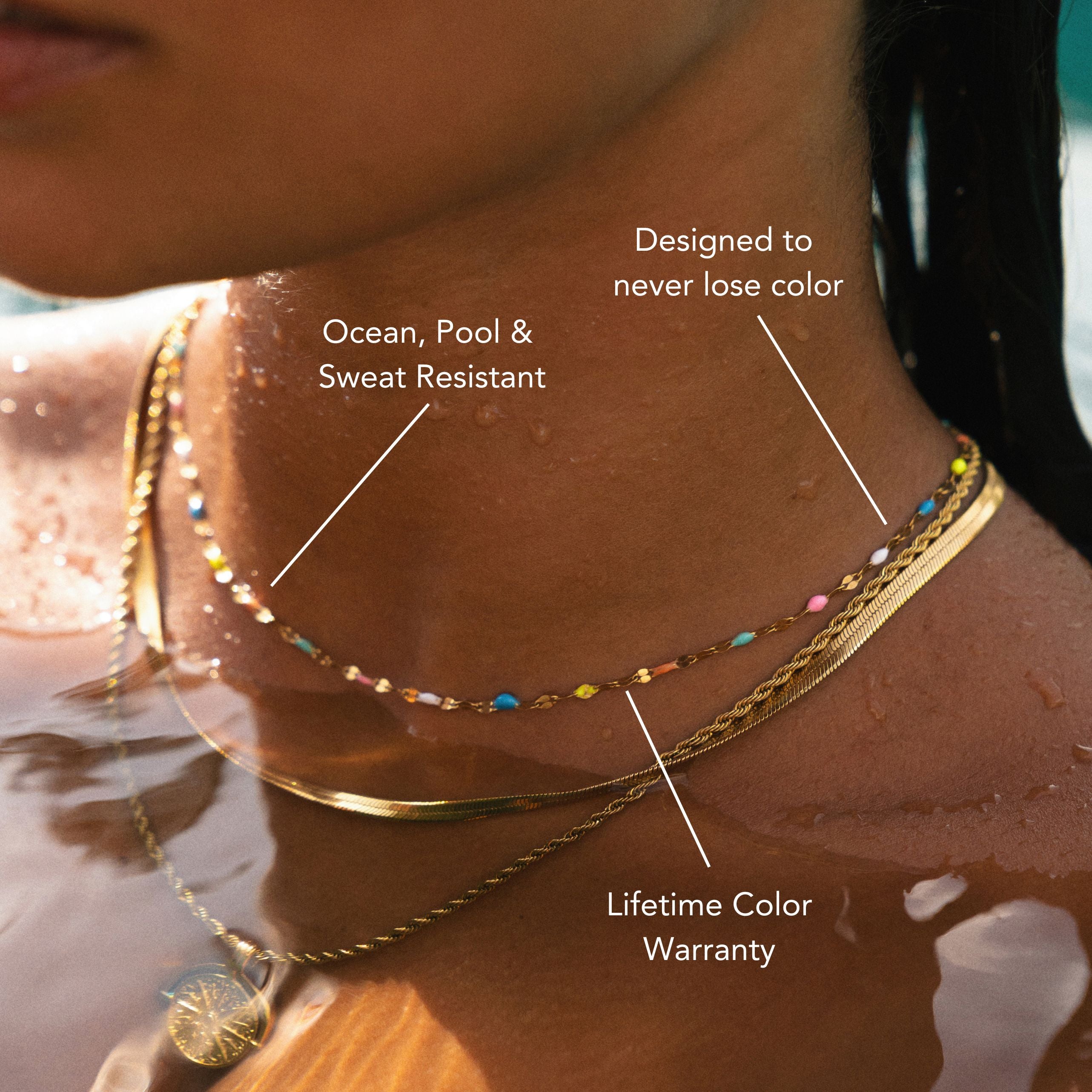

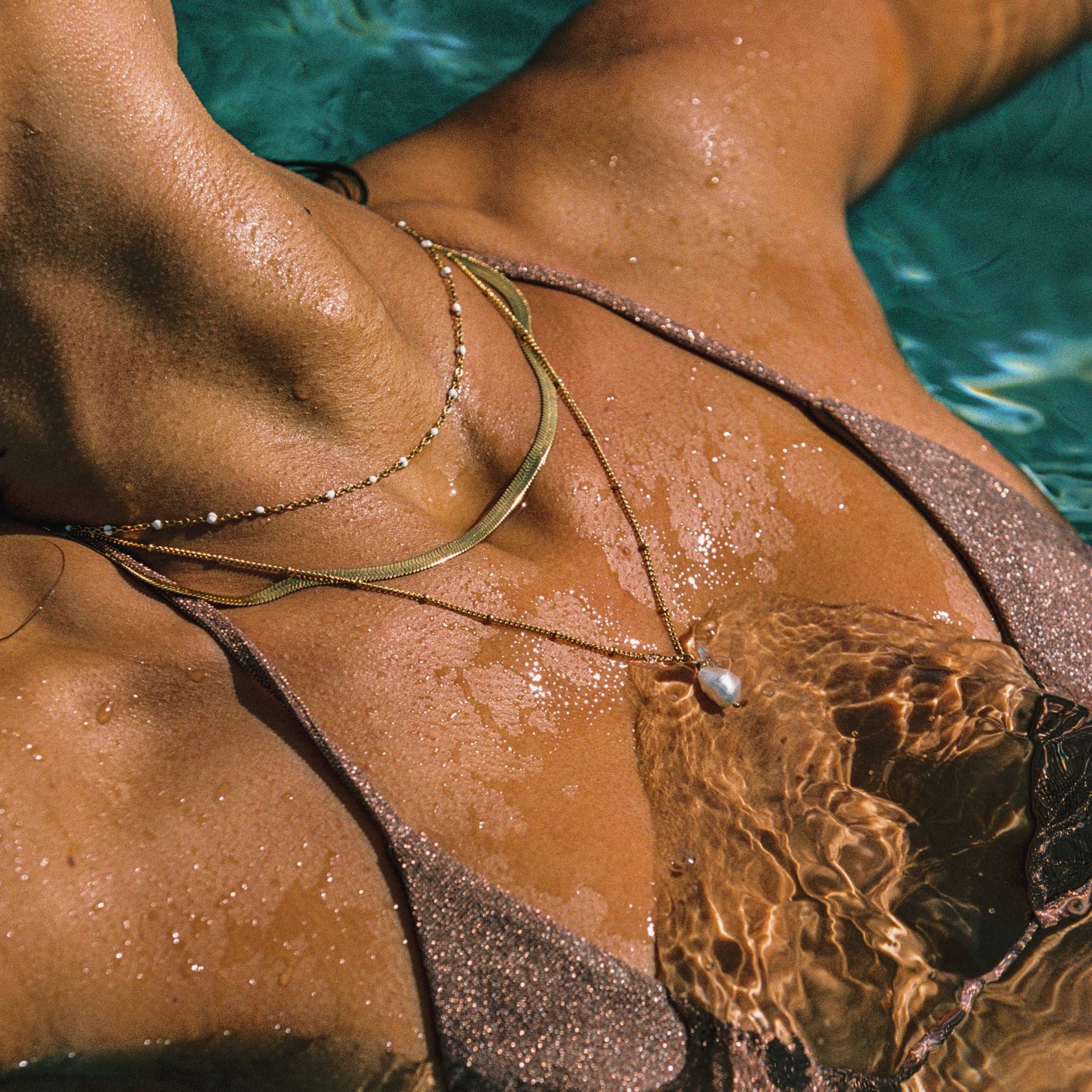
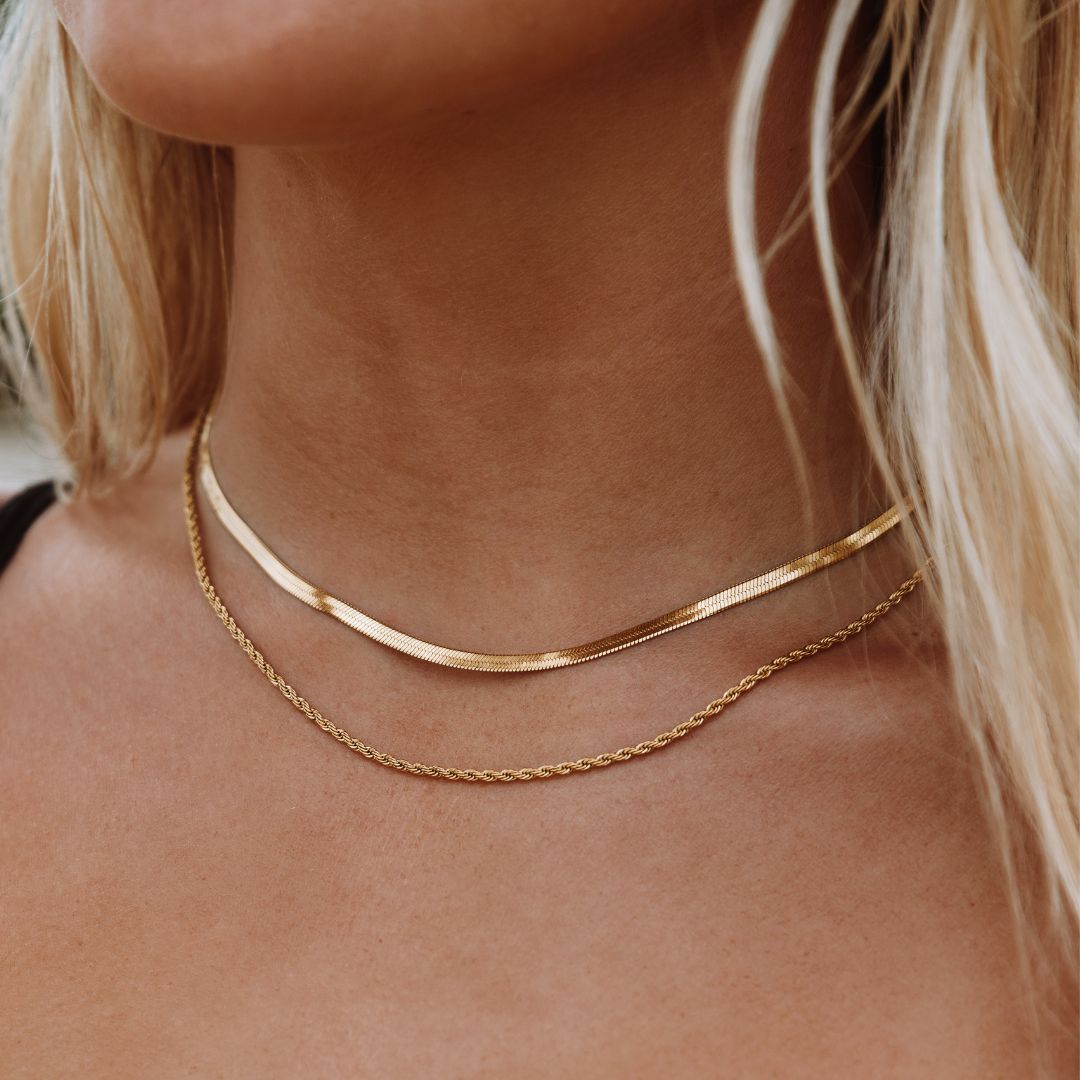



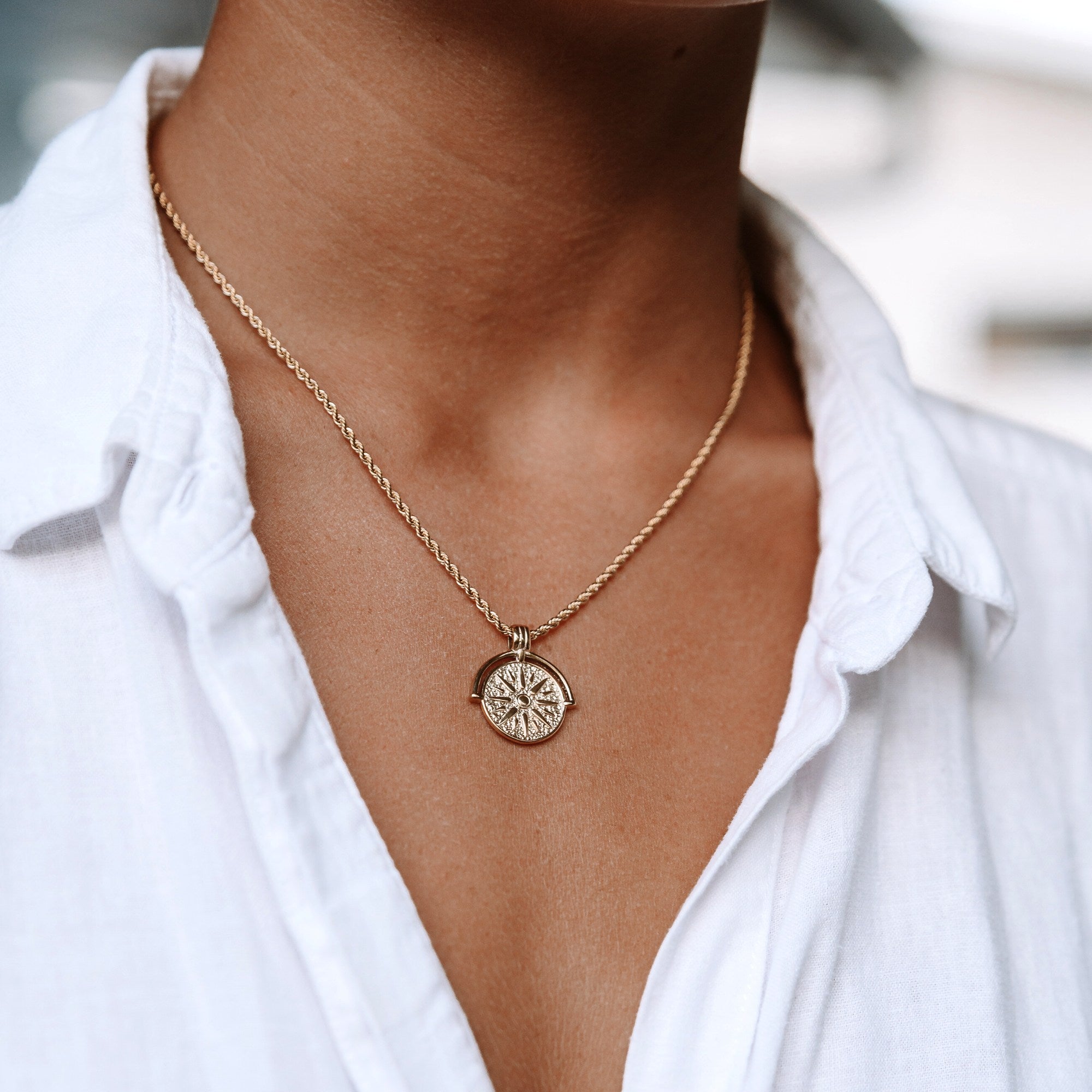


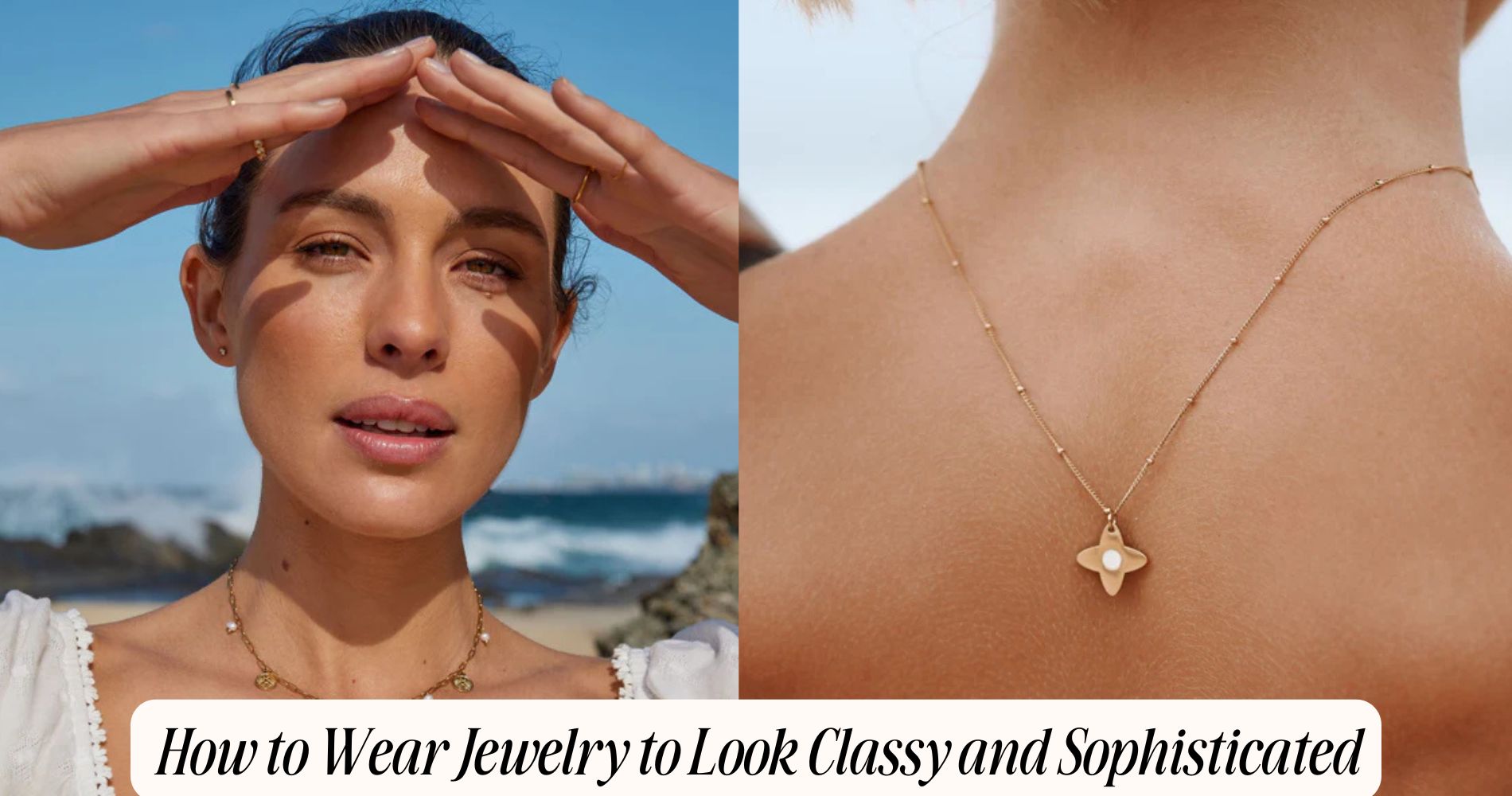




Leave a comment
This site is protected by hCaptcha and the hCaptcha Privacy Policy and Terms of Service apply.